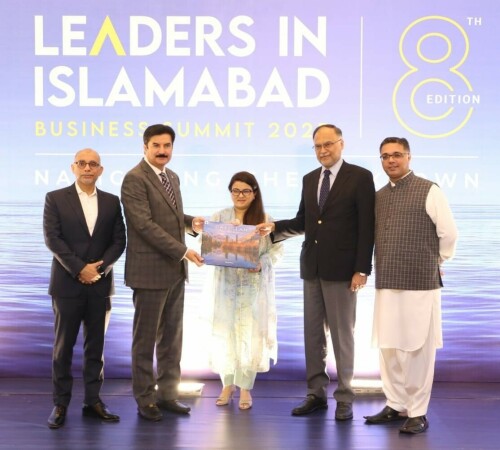Islamabad Business Summit Kicks Off, Addressing Economic and Environmental Challenges
ISLAMABAD: The 8th iteration of the Leaders in Islamabad Business Summit (LIIBS), a premier corporate gathering in Pakistan, commenced its first day at a local hotel. This year’s summit, themed “Navigating the Unknown,” brought together leading figures from the public and private sectors to tackle pressing issues in rapidly changing environments and develop effective solutions.
Muhammad Azfar Ahsan, Founder & Chairman of Nutshell Group and former Minister for Investment, initiated the event with a welcome address. He emphasized the critical need to address both significant economic and environmental uncertainties, and highlighted strategies for achieving substantial transformation.
“National prosperity relies on groundbreaking sustainable solutions,” he asserted. “All ecosystems, including workplaces, require a revised ecological and financial understanding of local resources, including overseas Pakistanis, as the foundation for Pakistan’s future economic competitiveness.”
Amir Shehzad, Chairman of Unity Foods Limited and co-host, opened his keynote by drawing attention to the shifting dynamics of global trade and the increasing urgency of climate action for Pakistan. He stated, “Pakistan’s crucial journey at this global juncture requires political stability and consistent policies to guide investors forward. Climate change is a major challenge, necessitating united public-private efforts. Our future depends on converting vulnerability into opportunity through comprehensive and forward-thinking strategies.”
The opening session featured insightful addresses. Shaza Fatima Khawaja, Federal Minister for IT & Telecom, noted, “Pakistan’s digital evolution is based on three key elements: comprehensive connectivity, citizen empowerment through essential tools and infrastructure, and literacy to fully utilize technology.”
Aisha Humera Chaudhary, Secretary, Ministry of Climate Change & Environmental Coordination, commented, “Addressing the climate crisis means turning pledges into tangible actions on the ground, inspiring local initiatives. Our ministry is dedicated to action-oriented climate policies, with cross-sector collaboration as our mandate.”
Faisal Karim Kundi, Governor of Khyber Pakhtunkhwa, concluded, “Local initiatives are paramount. KPK possesses immense historical and potential wealth. An empowered KPK strives to leverage its unmatched potential to enhance regional connectivity for Pakistan, serving as a bridge to the future.”
Senator Dr. Musadik Malik, Federal Minister for Climate Change & Environmental Coordination, stated, “We must restore nature and transition from ambition to implementation, urgently fulfilling climate objectives.”
Forging the Future: Discussions and Insights
The session “Forging the Future” included three engaging discussions. Muhammad Ali, Federal Minister & Advisor to the Prime Minister on Privatization, alongside Saquib Ahmad, Managing Director, SAP Pakistan, Iraq, Afghanistan & Bahrain, highlighted the importance of private sector involvement. Ali remarked, “Pakistan’s potential is untapped due to the disconnect between opportunity and investment. Greater government presence than private sector involvement results in lack of accountability. Meaningful engagement of the private sector is crucial to resolve this gap.” Saquib added, “Data-driven governance is essential for sustainability, and SAP is prepared to assist Pakistan in this transition.”
Dr. Ishrat Husain, Author, Economist, former Federal Minister & Governor, State Bank of Pakistan, observed, “Tariff escalations, trade conflicts, and the weakening of the World Trade Organization have created a challenging environment for developing nations.”
During a discussion moderated by Mosharraf Zaidi, Founder, Tabadlab, Gen Zubair Mahmood Hayat, Chairman Joint Chiefs of Staff Committee (2016-2019), stressed the importance of AI and data centers, stating, “Pakistan must establish high-quality AI labs and educate its youth. Systems and institutions have lasting impact.”
Justice Ayesha Malik, Judge, Supreme Court of Pakistan, emphasized the need for inclusion, stating, “Narratives are essential in law-making. We must incorporate the voices and experiences of women to ensure justice.”
Yousaf Hussain, President, Overseas Investors Chamber of Commerce & Industry (OICCI), shared, “Turning uncertainty into opportunity is vital for Pakistan. True navigation requires collaboration across sectors, shifting our focus from survival to excellence.”



Comments (0)
No comments yet. Be the first to comment!
Leave a Comment